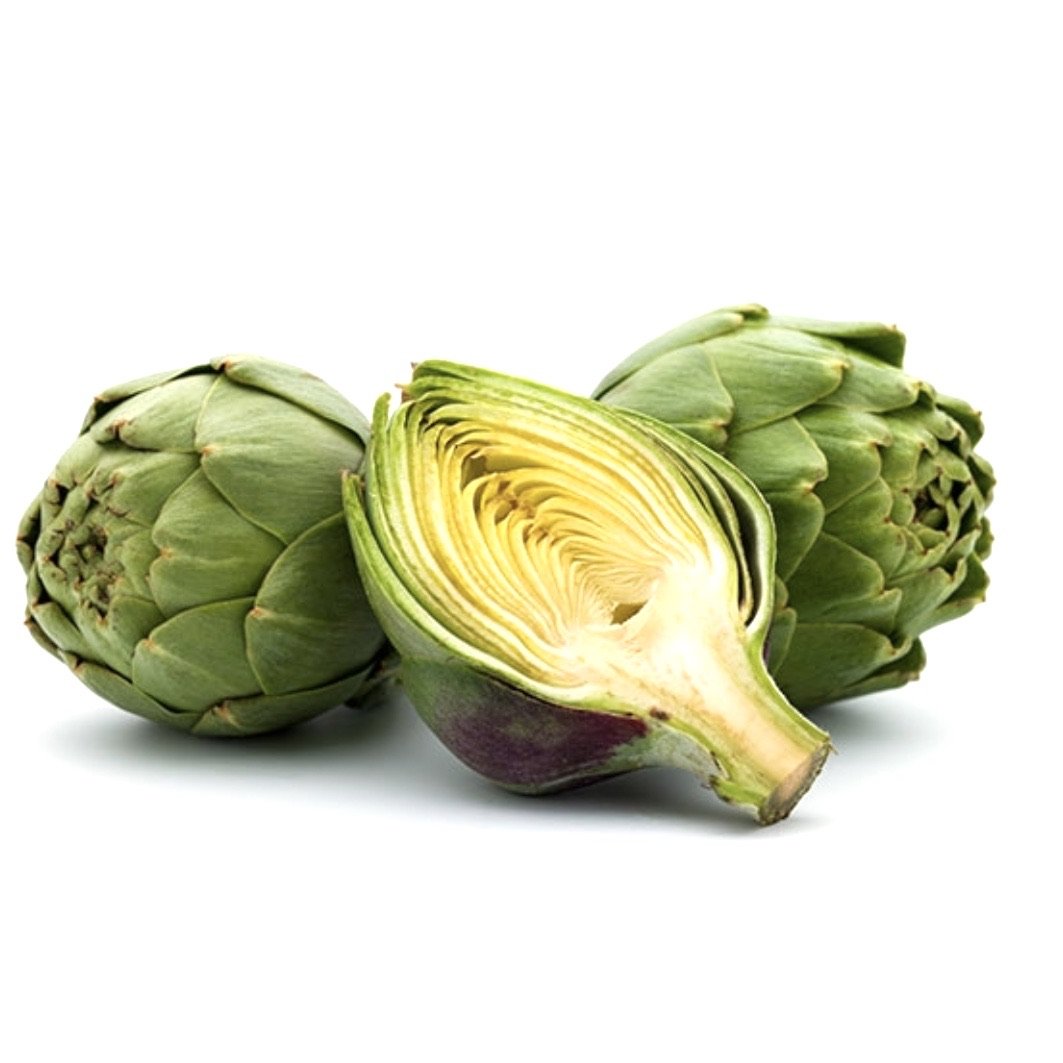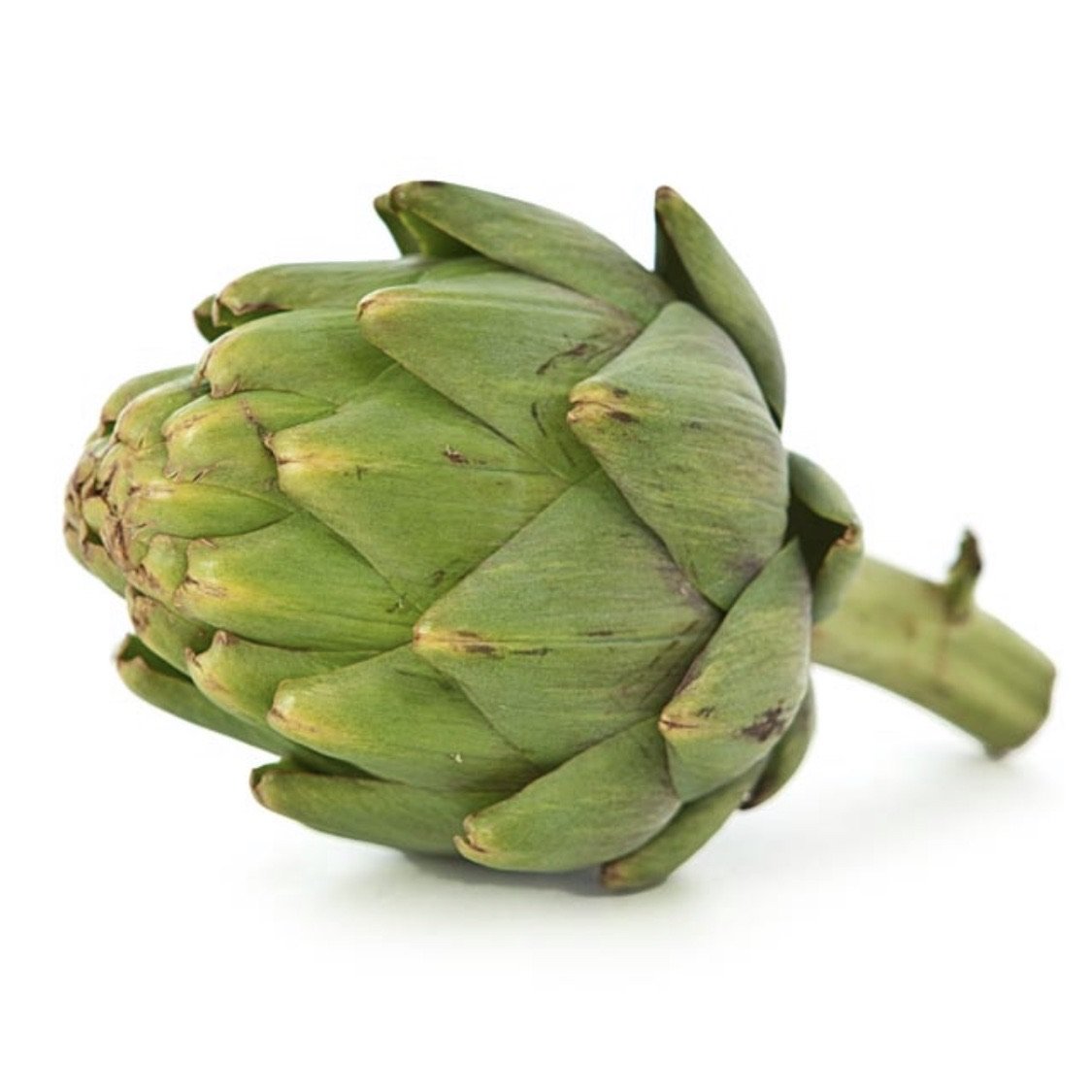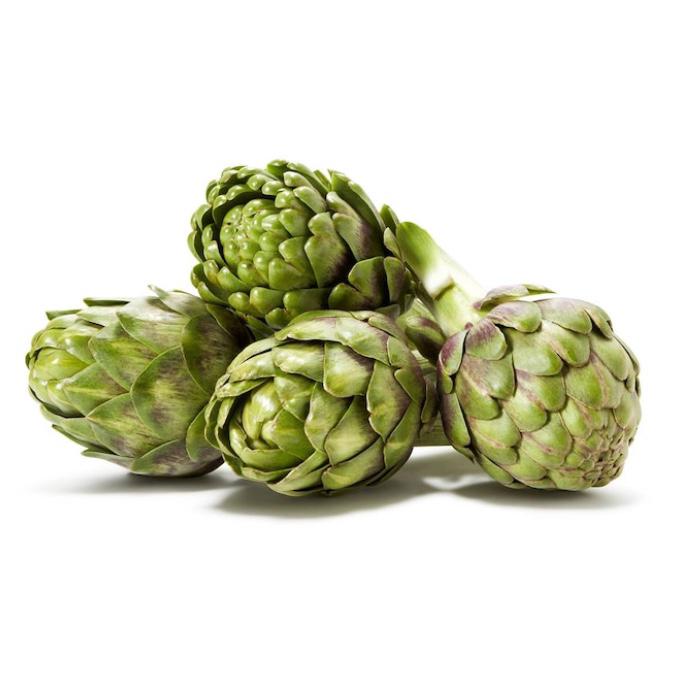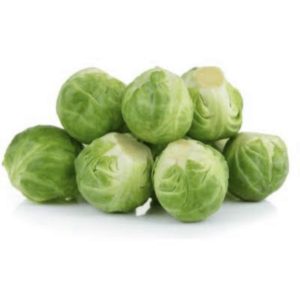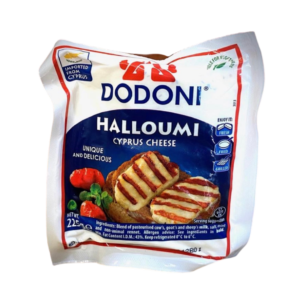Artichokes Globe | Each Good source of vitamin C and thiamine.
some dietary fibre, calcium, phosphorus, niacin and potassium.
Artichoke Nutrition Facts
One medium-sized artichoke cooked without salt (120g) provides 64 calories, 3.5g of protein, 14.4g of carbohydrates, and 0.4g of fat. Artichokes are an excellent source of vitamin C, fiber, and potassium. The following nutrition information is provided by the USDA.1
- Calories: 64
- Fat: 0.4g
- Sodium: 72mg
- Carbohydrates: 14g
- Fiber: 7g
- Sugars: 1.2g
- Protein: 3.5g
- Vitamin C: 8.9mg
- Potassium: 343mg
- Magnesium: 50.4mg
Carbs
Most of the calories in Artichokes Globe | Each come from carbohydrates. The carbs are primarily fiber and starch. There are 14 grams in a medium artichoke when you eat the leaves and the heart. You’ll also get just over 1 gram of sugar in a medium-sized artichoke.
Fat
There is a minimal amount of fat in artichokes (just under half a gram). However, artichokes are often served with melted butter or a cheesy dip, which increases the fat content. Fried and stuffed artichokes are also high in fat and calories.
Protein
A medium-sized artichoke contains 3.5 grams of protein. This is similar to a small baked potato or about a cup of cooked broccoli.
Vitamins and Minerals
Artichokes are high in fiber and are an excellent source of vitamin K and folate, which help with red blood cell formation and prevent neural tube defects.2
They are also a good source of magnesium, a mineral that is important for nerve and muscle conduction3 and can help improve sleep. Artichokes also contain vitamin C.
Calories
Like most fruits and vegetables, artichokes are low in calories (depending on preparation). One cooked, medium-sized artichoke has 64 calories. About three-fourths of these come from carbohydrate (including fiber). The remainder come from protein (about 25%) and fat (about 5%).
Summary
Artichokes Globe | Each are a highly nutritious vegetable that’s very high in fiber and low in calories, carbohydrates, and fat. Artichokes are packed with nutrients like vitamin C, magnesium, vitamin K, folate, potassium, and zinc.
Health Benefits
Thanks to their fiber, micronutrient, and antioxidant content, artichokes may help promote health and prevent some diseases and conditions.4
Supports Heart Health
One medium artichoke contains 7 grams of fiber, contributing to nearly one-third of your daily fiber needs. Fiber has many health benefits, such as lowering the risk of coronary heart disease, stroke, and hypertension.5
Artichokes are also a good source of potassium, a mineral that may help to lower blood pressure.6 A medium artichoke has 343 milligrams of potassium (for reference, a similarly sized banana has 422 milligrams).
May Lower Cholesterol Levels
Artichokes Globe | Each may also support heart health by lowering cholesterol levels. Fiber contributes to this effect, as do some of the antioxidants in artichokes. Studies of artichoke leaf extract have shown it to reduce total cholesterol, LDL (“bad”) cholesterol, and triglycerides.7
May Improve Liver Health
Among the most powerful phytonutrients in artichokes are cynarin and silymarin. These have strong positive effects on the liver, helping it clear out toxins.8
Fights Effects of Aging
The antioxidants in artichokes, including vitamin C, are important in helping the body fight oxidative stress and inflammation.9 These processes are involved in many chronic and age-related diseases.
Vitamin C also helps repair cells and supports immune function.10 A study published in 2018 described how compounds in artichoke produce “anti-age effects” on the skin.11
Promotes Bone Health
The vitamin K in artichokes is a fat-soluble vitamin that is important for bone health and blood clotting.12
May Help Fight Cancer
Research indicates that artichokes may contain anti-carcinogenic properties.13 One study published in 2015 (done on cancer cells in test tubes, not in humans) showed that the polyphenols—beneficial plant compounds with antioxidant qualities—in artichokes slowed the growth of breast cancer cells.14 Another 2015 study found similar effects in mesothelioma.15
Improves Gastrointestinal Symptoms
Some preliminary research has shown that artichoke leaf extract may help reduce the symptoms of irritable bowel syndrome (IBS).16
In addition, the fiber in artichokes can contribute to a lowered risk of diabetes, obesity, and gastrointestinal conditions such as reflux, ulcer, diverticulitis, and constipation.5 The fiber in artichokes includes prebiotics, which supports “good” bacteria and is important for gut health.
Allergies
Allergy to artichoke and related plants in the Asteraceae family (including ragweed, chamomile, daisy, and sunflower) is possible, especially as an environmental allergy that can cause eczema or hayfever.17 Some people who are allergic to these plants experience cross-reactivity with related foods, including artichoke, either when handling them or consuming them.18
Adverse Effects
Artichokes provide vitamin K. If you take Coumadin (warfarin), a common prescription blood thinner, it’s important to ensure that your vitamin K intake is consistent, meaning you eat about the same amount of foods containing vitamin K daily. Discuss your levels with your doctor so that you have a better understanding.
Artichoke Extract Warning
If you have bile duct obstruction or gallstones, avoid artichoke extract, which can cause further issues. Discuss the use of artichoke extract with your doctor if you have any medical conditions or if you are pregnant or breastfeeding.
Varieties
There are more than 100 varieties of artichokes. They range in size from baby to jumbo and in color from dark green to purple, and in shape from large spheres to long, oval cylinders.19
The Jerusalem artichoke, also known as a sunchoke, is a tuberous vegetable unrelated to leafy green “globe” artichokes.
You can also purchase jarred, canned, or frozen artichokes (usually just the hearts). Jarred or canned artichokes marinated in oil and vinegar tend to be high in calories and sodium. Look for artichokes packed in water, and rinse them before use.
When It’s Best
Most of the artichokes in the United States come from California. artichoke season is spring, but you can usually find fresh artichokes all year long.
How to Prepare
To start, trim the bottom stem of the artichoke and cut off some of the top hard-tip leaves. Pull off some of the tougher outer skin and tougher outer leaves. The choke is now ready to be steamed.
For stuffed artichokes, start by trimming the bottom and top and cutting off some of the harder leaves. Next, dig out the choke with a spoon or paring knife to get out the hairy, spiny part.
To sauté your artichoke, follow the same technique; after you take out the choke, quarter the artichoke down the middle and sauté.

